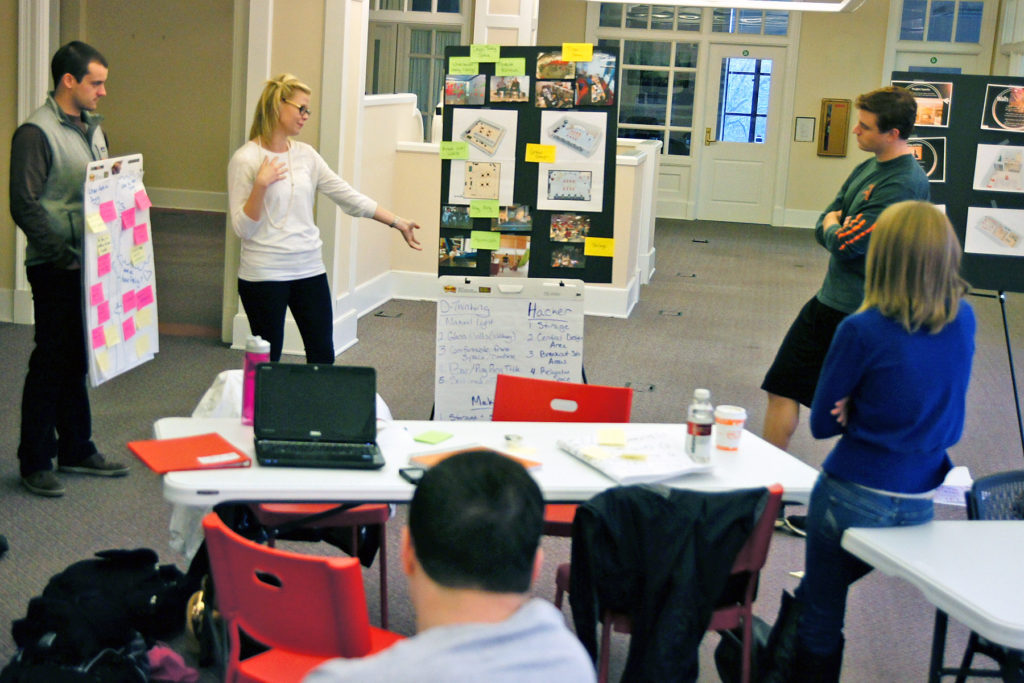Innovation is anything but business as usual.
That’s the spirit behind a spate of offerings at UGA that is providing students with fresh approaches to business learning. From groundbreaking competitions to pioneering courses, students are finding out just how far out-of-the-box they can go.
UGA’s Next Top Entrepreneur is a campuswide competition in which students and their business plans square off, American Idol-style, for prize money and potential capital investments. Along the way, competitors move through information sessions, seminars and individual coaching meetings to learn how to properly devise a strategy and pitch their business plans.
The brainchild of Chris Hanks, a lecturer in the Terry College of Business’ Entrepreneurship Program, the competition helps generate several successful companies every year-many run by students with no formal business training.
“At the time the competition began, we were just an idea,” said Adam Berlin, who along with student Juan Calle won the very first Next Top Entrepreneur competition with their company SEC Excursions, a full-service trip planning business for football fans. “We met with Chris Hanks extensively, and we learned there are so many resources for entrepreneurship at Terry and the University of Georgia.”
Years later, SEC Excursions, like many businesses from the competition, still is running strong-something that Hanks attributes to the discipline and drive he sees in the students.
“I want the University of Georgia to be famous for entrepreneurship,” Hanks said. “I want to have a program filled with success stories that include a legacy of successful ventures that were started as a result of our efforts. Peter Drucker once said that there’s no entrepreneurial mystique, it just comes down to discipline. I hear students and those around the state say, ‘I want to do it, but I just don’t know how. I want to do it, but I’m scared. I want to do it, but, but, but.’ Let’s take those buts and just cross the bridge.”
In addition to the competition, the Accelerator Program at the Terry College provides student startups with access to successful entrepreneurs, advisers and investors who help young businesses grow revenues, stay focused on the right issues and develop key contacts. Open to students who apply at the beginning of each semester, the Accelerator Program offers honest, unfiltered advice and guidance on critical business decisions for UGA students. But not everyone yearns to be a startup success story. For those more interested in finding new ways to help existing companies, offerings also abound.
In the Innovation Projects course at the Terry College, MBA students act as consultants to tackle live business problems for corporate, government and nonprofit clientele. Taught by veteran entrepreneur and Terry faculty member David Sutherland, the course delivers actionable, strategic plans on specific company projects.
Partnerships have included the Centers for Disease Control and Prevention, Toyota, Cisco Systems, 1,000 Faces Coffee, Caterpillar Inc., Equifax and many more. Each company comes to the course with a specific challenge-be it grappling with an emerging market, pursuing a new project or making branding decisions-that teams of MBA students take up for an entire semester.
The goal is for the student consultants to create an actionable business plan that meets the goals of the company and gives the students real hands-on experience.
“In the innovation track, we separate from the startup/entrepreneurship track, which is about all the issues with a new company,” Sutherland said. “Innovation is about established companies, and there’s a whole different set of issues to deal with as a manager of innovation inside of companies. We want to give our MBA students the ability to walk into companies and say, ‘I’m not only good at analytics and finance, but I’m also good at what it takes to come up with new ideas and develop those ideas to get them into the marketplace.’ ”
As one of a cluster of classes in the Terry College that focus on innovation training, the course divides students into small multidisciplinary teams. Students spend half their time in the classroom and the other half working out solutions for their clients’ problems. At the end of the semester, students present recommendation and implementation plans to their clients.
“We asked for students with real estate experience to help us evaluate the merits of a new investment strategy to purchase multifamily residential land,” said Scott Denbow, vice president of Reynolds Capital, a former partner with the course. “Looking at the fundamental of the apartment market across the country and in the Southeastern U.S., they pulled the data into a model, weighting various factors that were important to us. They provided a top 10 market list for the Southeast and recommended that we not only pursue multifamily residential land, but also senior living sites. The model they built was beyond our expectations-it was very thoughtful and useful. With only a modest amount of guidance, they did a great job.”
